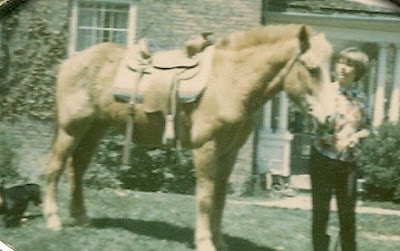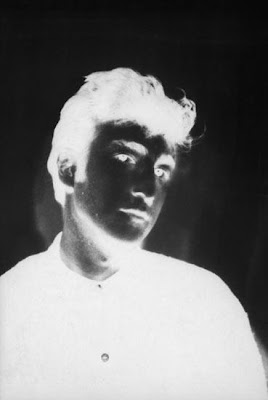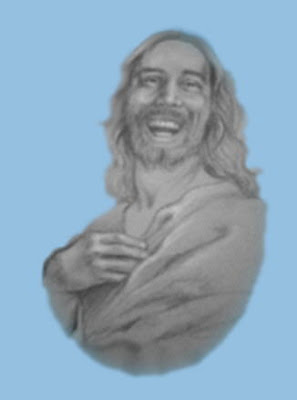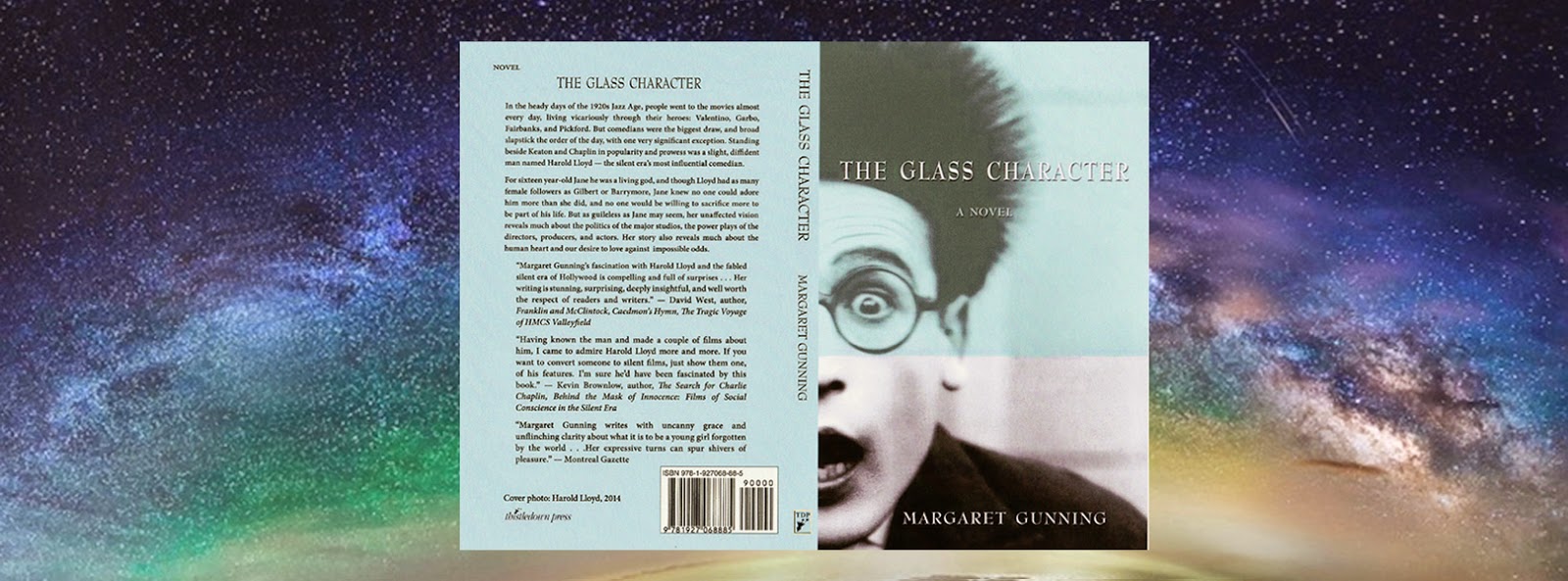
Like almost every girl I knew, I longed for a horse of my own. I'd read all the Marguerite Henry stories, Misty of Chincoteague, King of the Wind, and Walter Farley and Black Beauty, so I knew I understood them.
But I also knew I stood a fat chance of actually getting one: they cost too much money, my Dad kept saying; we'd have to board him; I'd never really had riding lessons and couldn't handle much more than an easy tourist trail.
All true.
So what was it that changed his mind? His business rival bought a horse for HIS daughter, and suddenly the race was on to find a tonier, more expensive
one.
How I ended up with Rocky (who was neigh-ther) was this. Dad got me a very beautiful but semi-wild two-year-old palomino mare named Pot 'o Gold. I discovered the first time I tried to ride her that she hated anyone getting on her back. When I put my foot in the stirrup, she took off.
Dad thought this was my fault. He had the vendor's daughter work with me, but the thing is, she was much more experienced, practically a trick rider, able to achieve a flying vault, catching Goldie just before her hindquarters faded off into
the sunset.
Finally we had to admit defeat. I couldn't have a horse. I was desolate. I kept nagging and whining and saying we could buy a better horse, a tamer horse. A horse I could handle, a horse I knew personally! Suddenly the light bulb went off over my
head.
At the Lazy J Ranch, where I spent most of my Saturdays riding the trails and helping the staff groom and muck out, I had a favorite, a strawberry roan named Rocky. I couldn't say exactly why I liked him so much: he wasn't much to look at, a bit stocky, Shetland pony genes poking through the one-quarter Quarter Horse of his
heritage.
Maybe because he was a rent-a-horse ridden by dozens of non-riders a day, he was stubborn. He did weird things. He pawed at streams until the water flew. He also pawed at mud.
He had a ridiculous whinny, sort of a show-off whinny, and when I chased him around the pasture with a bridle, he arched his neck and did a ridiculous takeoff of a show horse high-step. Just to annoy me, he pretended to spook at harmless things like gum wrappers.
He had a rubbery pink-and-grey nose, perfect for kissing. He was a shade over 14 hands, small enough for me to just hop on.
"I want Rocky," I told my Dad.
"You want Rocky? Can't we do better than that?"
"No. I'm used to him. He knows me."
My Dad was naive enough to offer the same amount for Rocky that he had paid for
Goldie. Horses were horses, weren't they?
It was the beginning of several years of idyllic moseying along beside the railroad tracks (and I have no idea how we handled the trains). Of picnic lunches in the fragrant grass, my girlfriend Shawne sitting behind me and hanging on tight as we bumped along.
Time stopped when I was with Rocky. I groomed his white-mottled red coat until it (sort-of) shone. I cleaned his feet with a hoof pick, tenderly removing stones. I would have braided his mane, but someone at the stable kept shaving it off so he looked like a merry-go-round horse.
There were a couple of hair-raising episodes with Rocky that were at odds with his implacable reputation. Once in a while in the summer I rode him the two miles or so from the stable where we boarded him (along with a bunch of tall Standardbred race horses: he became the stable mascot) to my house on a quiet street in
Chatham.
Neighbors were a little disconcerted by the sight of a horse on their street. Silverwood Dairies had stopped delivering milk by horse and wagon several years earlier; what was this nag doing on the street, leaving great steaming deposits to step over?
It was grand to promenade the street like that. Once I even took him to my high school, and he was an instant hit. It was the one time I felt popular.
Anyway, this particular time, he seemed to be perfectly content in our back yard mowing the lawn while my dog sniffed around his heels and (disgustingly) ate some of his poo.
As we had dinner, with the usual genteel classical music playing in the background, I suddenly heard a sound like coconuts being hit together. Buddle-up, buddle-up. We saw a reddish blur out the window.
My mother exclaimed, "Oh dear Lord, it's the horse."
Rocky had somehow broken free, and was high-tailing it back to the barn. Literally! His tail was held as high as an Arabian's, his head thrown back
majestically.
We jumped in the car in a panic, trying to stop him or at least get him to slow down. He was galloping flat-out in the exact centre of the road, getting more and more lathered. My Dad tried frantically to swerve him over to the shoulder so he wouldn't be hit.
When he saw the big barn full of Standardbreds, he immediately checked his pace. Threw up his massive head and let go with one of those ridiculous whinnies. Then trotted elegantly through the gate.
The other episode is not so funny, one of those things that ended well, but only just. I had a bad habit of riding Rocky in unusual places (railroad tracks?). One afternoon we clopped our way through a cow pasture where a gorgeous Jersey named Bambi lived. The mud was maybe an inch or two deep, no
big deal.
Then - I will never forget this, a feeling like an elevator dropping away beneath me. My horse slid down into an invisible bog, and was instantly mired up to his belly. I had no idea what to do but hold on as he bucked and heaved, trying to pull himself
out.
I wondered if I should try to get off, try to get help, get a rope or something, but no, Rocky insisted on lurching ever more violently to free himself. My heart was in my throat. I was sure he'd break his leg and have to be put to sleep.
Then, with a great shuddering heave and a sucking sound such as you've never heard, he was out. We both stood there trembling. He had his head down and I gasped with fear, wondering how he could have come through such a thing
unhurt.
Then, beginning at his nose, he began to shake himself, the great wave travelling from his head to his shoulders to his whole body to his tail. He must have taken shaking lessons from a wet dog. Remarkably, he seemed to be OK, though coated with glistening brown as if he had been dipped in chocolate.
I carefully hosed him down, though it took an hour, since he stopped me several times to shake everything off. I was so proud of him, so relieved, and my, didn't he look handsome, all wet, his sorrel coat glistening in the summer
sun.
Feeling that a reward was due, I turned him loose in the pasture. He walked around with his nose to the ground until he found a suitable patch of mud.
Carefully lowered himself down.
And rolled until he was so upholstered that I could barely tell he was a horse at all.






















.jpg)






.jpg)





